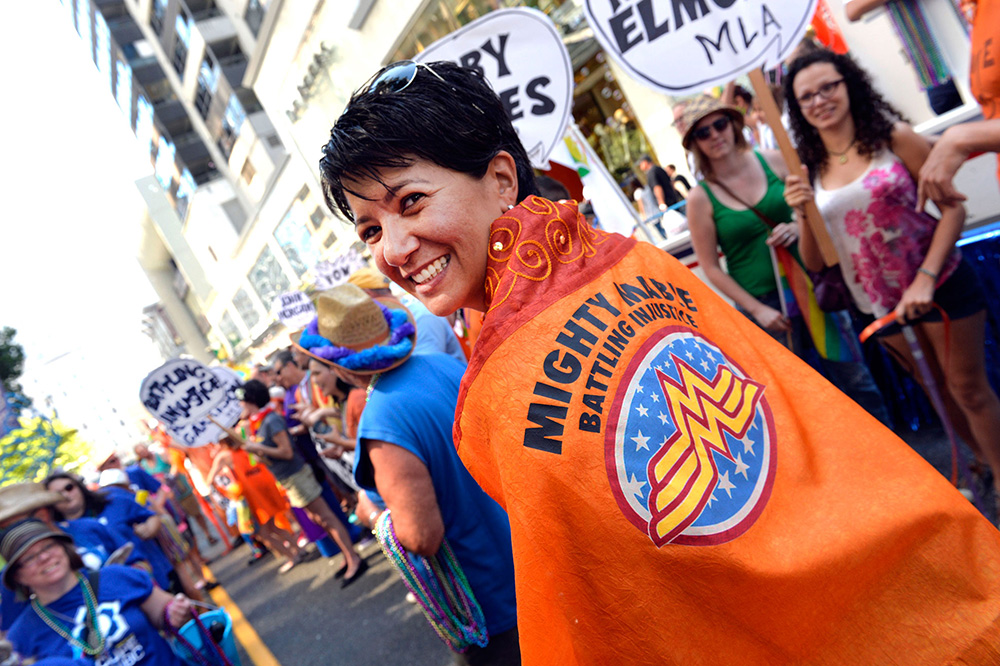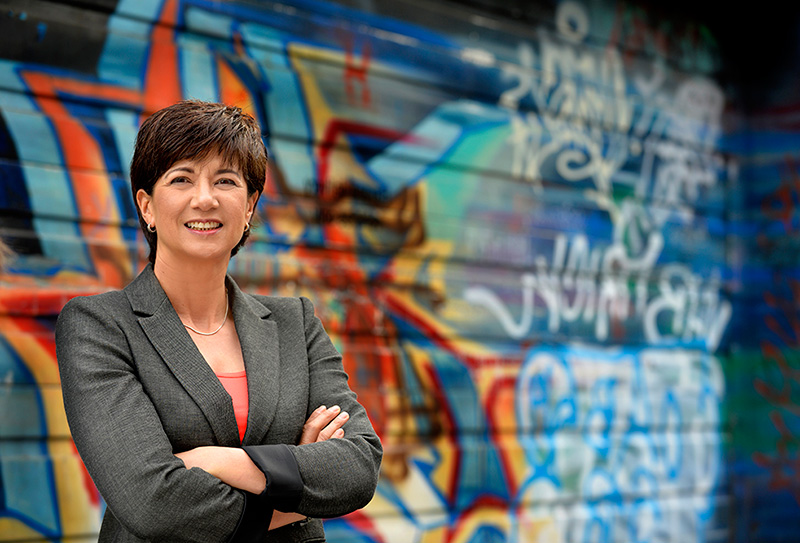Mable Elmore’s role as parliamentary secretary for seniors’ services and long-term care puts her at the centre of one of the government’s toughest challenges.
But some supporters in the Filipino community are angry the Vancouver-Kensington MLA wasn’t made a full cabinet minister in the new NDP government.
The fourth-term MLA is preparing for a busy few years working with Health Minister Adrian Dix and provincial health officer Dr. Bonnie Henry on improving seniors’ care after the pandemic highlighted fundamental, dangerous flaws in the current system.
Elmore is “really well-positioned to take on this portfolio, because it’s related to issues of equity and how we have valued and treated our most vulnerable members of society,” said Dr. Joanie Sims-Gould, an associate professor in the department of family practice at the University of British Columbia.
Elmore has been engaged in B.C. politics for a long time. She advocated against South African apartheid when she was in high school; worked with the Philippine Women Centre of BC in the late 1990s; with the BC Federation of Labour, participated in the longest public transit strike in Canadian history while she worked as a transit operator in 2001, and organized anti-war marches throughout the mid-2000s.
But Elmore took a while to warm up to the idea of public office, let alone the legislature.
“I think because I never saw anybody like me who was elected,” said Elmore, an openly queer woman of colour. There had never been an MLA of Filipino descent in the province.
It wasn’t until 2005, while teaching women how to run for leadership positions in the Canadian Auto Workers Union, that her thinking began to change. It was ironic: her own students would approach her after class, playfully asking when she would start taking her own advice.
Elmore tentatively brought up running for city council with trade unionist and disability activist Marion Pollack on a ride home one evening. Pollack advised her to run instead for the NDP’s nomination in the Vancouver-Kingsway federal riding and “cut me a cheque right there in the car,” Elmore recalls.
While Elmore lost the nomination by a slim margin of about 45 votes, she saw what being elected could mean for the people rooting for her. In 2009, Elmore’s community base won her the Vancouver-Kensington riding for the BC NDP, beginning a long career in provincial politics.

As the sole MLA of Filipino descent in the province — and only the second out lesbian — Elmore recognizes the symbolism and responsibility of the role.
She hopes to maintain her roots as a grassroots advocate even as she takes on bigger portfolios and weightier responsibilities, keeping her community in mind.
‘How are we going to ensure that this doesn’t happen again?’
UBC political science professor Gerald Baier notes that while parliamentary secretaries may not have a lot of decision-making power and be seen as the “minor leagues” of government hierarchy, Elmore will be handling a crucial portfolio, one that seniors’ groups have said deserves its own ministry.
“If anything has been shown by the COVID pandemic, it is the importance of long-term care.... And the parliamentary secretary who’s responsible for that is going to be doing a lot,” said Baier.
Elmore will play an important role in liaising with researchers, seniors and their families and advocating within government for action in response to their concerns. Her mandate from Premier John Horgan includes continuing to hire 7,000 new health-care workers in long-term care and assisted living, building more public seniors’ beds and developing a “silver alert” system to help assist first responders in locating missing seniors.
Experts say that B.C.’s Health Ministry will have to craft a careful balance between preventing COVID-19 in care homes and responding to families’ concerns about isolation and lack of visitors as the second pandemic wave continues. A report in mid-November from B.C. seniors’ advocate Isobel Mackenzie showed that stringent restrictions on visits have taken a significant toll on residents’ mental and emotional well-being.
The pandemic has also illustrated how workers’ rights are tied up in the impact of COVID-19. During an outbreak at North Vancouver’s Lynn Valley Care Centre — the site of Canada’s first death from COVID-19 — 18 health-care workers were infected. Workers spoke about how communication issues put further strain on their understaffed facility. The centre was largely staffed by middle-aged Filipina-Canadians, who occupy many of the caregiving roles in the province and, like health-care workers across the country, have been under significant stress for months on end.
Elmore hopes to focus on retaining staff and reiterated the NDP’s promise that pandemic wage increases for long-term care workers will be permanent. She’s also a fan of the one-site policy, which has ensured employees only work at a single facility. This policy prevents the spread of a potential outbreak and improves conditions for care workers who often bounce around between locations to scrape hours together, Sims-Gould said.
Privatized seniors’ homes in the province have been widely criticized for poorer quality of care, from low staffing to cost-cutting to poorer resident outcomes, and the debate over their future will be another key issue for Elmore. A petition to end for-profit seniors’ care from the BC Government and Service Employees’ Union gained almost 14,000 signatures in September.
While Elmore didn’t say whether she would advocate against for-profit seniors’ care, she said she is excited to increase the number of public long-term care beds in the province, with more accessibility for low- and middle-income families. She believes legislation that pushes greater standardization of care requirements across the board will also help.
“This is a big, positive step across the whole sector. We’re looking to restore provincial standards, for wages, benefits and working conditions,” said Elmore.
Elmore will also have to deal with a roll-out of the COVID-19 vaccine. On Friday, the National Advisory Committee on Immunization said initial doses should be reserved for long-term care home residents and seniors over 80.
Above all, advocates want to see changes in seniors’ care that extend beyond the pandemic and create long-term change.
“Many of the flaws that have been identified in this period of COVID-19 are structural flaws that were there before. This is not new,” said Dr. Gloria Gutman, former director of the Gerontology Research Centre and department of gerontology at Simon Fraser University. She describes the sector as vastly under-resourced.
UBC’s Sims-Gould, whose research focus is prevention and health promotion, agreed Elmore shouldn’t focus solely on the current crisis.
“A lot of what we’re seeing right now with seniors and older adults and long-term care is a result of not anticipating, of not potentially preventing, this catastrophe,” she said.
Canada is struggling to meet the needs of its aging population, and Gutman hopes B.C. will emerge as a national leader in long-term care post-pandemic.
If Sims-Gould had one question to ask Elmore, she said, it would be an easy choice.
“How are we going to ensure that this doesn’t happen again?”
A milestone or a slight?
Elmore’s appointment seems like an exciting new opportunity to many but feels like yet another snub to B.C.’s Filipino community, which makes up the third-largest ethnic group in the province and has fervently supported Elmore since she ran to become the first MLA of Filipino descent in 2009.
The week before Horgan’s cabinet appointments, the community organized a petition asking for provincial support for a Vancouver-based Filipino community centre, Tagalog classes in B.C. schools — and Elmore’s appointment to a ministerial role.
They also penned an open letter to Horgan asking him to consider Elmore as a minister, which was signed by 55 community organizations from across the province.
“Anything less amounts to the continued marginalization of our community and is an affront to the dedication and service of Filipinos to B.C. over the years,” the letter reads.
Elmore said the efforts show the importance of representation for the community, the importance of “seeing someone in a leadership position that looks like you or reflects you in some capacity.”
RJ Aquino, a Vancouver advocate and organizer who helped put together the petition, said Elmore helped him get involved in organizing after he introduced himself at a fundraiser in 2010. He was becoming a father, and wanted to help shape the community his children would eventually grow up in.
“Reflecting on it, it’s been actually quite amazing in terms of how she was able to introduce me to this world and not just open the door but hold the door open.”
Aquino represents Elmore’s enthusiastic support base, which he described as a “large and potent” force — one that stems not just from her personal politics, but what she represents in the province. The community was intensely disappointed and angry when she was not made minister this year, he explained, especially after advocating for the same thing in 2015.
“A lot of people that have been supporting or have known Mable since the beginning are at best, confused and frustrated — at worst, fed up and insulted.”
But they won’t let that translate into political apathy, he said.
“It’s so exciting to see how much more determined the Filipino community is, how much more engaged, and that increasing sophistication in the understanding of what political organizing is, and its potential.” ![]()
Read more: Health, Labour + Industry, BC Politics

















Tyee Commenting Guidelines
Comments that violate guidelines risk being deleted, and violations may result in a temporary or permanent user ban. Maintain the spirit of good conversation to stay in the discussion.
*Please note The Tyee is not a forum for spreading misinformation about COVID-19, denying its existence or minimizing its risk to public health.
Do:
Do not: